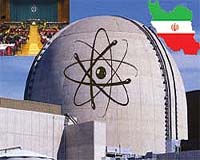 |
Dubai, United Arab Emirates (UPI) Mar 9, 2009 Iran and its proxies, Hezbollah and Hamas, are building underground tunnel and bunker systems for their war against Israel. The United States noted the strategic importance of the military complexes when it imposed sanctions Feb. 10 on four companies run by Iran's Islamic Revolutionary Guards Corps that specialize in underground engineering projects. These little-known companies -- the Fater Engineering Institute, Imensazen Consultant Engineers' Institute, the Makin Institute and the Rahab Institute -- are subsidiaries of Khatam al-Anbia. This is a sprawling construction empire that has been under U.S. Treasury sanctions since 2007. It is owned by the Revolutionary Guards, which has become a vast military-based conglomerate that controls much of Iran's economy. Iran is using these firms in its efforts to provide hardened underground complexes for its nuclear facilities, such as the new uranium enrichment center near the holy city of Qom that is being built inside a mountain. According to Arab sources, engineers from Khatam al-Anbia helped Syrian build several underground bunker complexes. They also acted as consultants to Hezbollah, which has built an elaborate network of bunker complexes containing missile storage and launching facilities, command and communications centers and linking tunnels in south Lebanon following the 2006 war with Israel. Similar underground networks have been built in the Bekaa Valley, Hezbollah's heartland in northeastern Lebanon along the border with Syria, which supplies much of the movement's weaponry. An earlier system built in the south, and largely undetected by Israeli intelligence, gave Hezbollah a decisive advantage in fighting Israeli ground forces during the second half of the 34-day war in 2006. Hamas, the militant Palestinian Islamic group that controls Gaza, is also reported to have benefited from Iran's engineering outfits in the construction of underground arms dumps and supply tunnels linking southern Gaza to Egypt's Sinai region. These networks provide Iran and its allies with underground facilities that are difficult to destroy from the air. The Rafah tunnel system has been repeatedly attacked in Israeli airstrikes but continues to function. The difficulties in knocking out Iranian underground targets is causing considerable concern in Israel, which has threatened to mount pre-emptive airstrikes -- and possibly ballistic missiles as well -- in a bid to destroy or cripple Iran's nuclear infrastructure. In February, Defense Minister Ehud Barak suggested to the Knesset's Foreign Affairs and Security Committee that the West had found itself in an awkward position because of the Iranian focus on underground facilities. The Qom plant, he stressed, was "located in bunkers that cannot be destroyed through a conventional attack." Israel wants to get its hands on the most advanced of the large bunker-buster bombs being developed by the Americans. The Jewish state's air force is believed to have received 100 5,000-pound GBU-28 penetrating bombs from the United States in 2005. This weapon, the first of the current generation of massive bunker-busters, was developed by the U.S. Air Force during the 1990-91 Gulf War against Iraq. The laser-guided, 19-foot-long weapons, designed specifically to destroy Saddam Hussein's command centers, were built by Lockheed Martin. They can penetrate 100 feet of earth or 20 feet of concrete. The Americans have refused to supply Israel with more powerful variants, apparently to prevent it launching a unilateral assault on Iran. The most powerful bunker-buster in service with the U.S. Air Force is the GBU-57A/B, known as MOP, for massive ordnance penetrator. This 20.5-foot, 30,000-pound bomb can penetrate 200 feet of reinforced concrete before its warhead of 5,300 pounds of high explosive detonates. In October 2009, the U.S. Department of Defense secured congressional approval to divert funds to accelerate production of this pulverizing weapon.
Share This Article With Planet Earth
Related Links Learn about nuclear weapons doctrine and defense at SpaceWar.com Learn about missile defense at SpaceWar.com All about missiles at SpaceWar.com Learn about the Superpowers of the 21st Century at SpaceWar.com
 Ex-Mossad head for military strike on Iran
Ex-Mossad head for military strike on IranBerlin (UPI) Mar 9, 2009 The world needs to get ready to use military force to prevent Iran from getting a nuclear bomb, the former head of the Israeli intelligence service said Tuesday in Berlin. Danny Yatom, who headed Mossad from 1996-98, said the prospect of a nuclear-armed Iran poses the greatest threat to global security, "even more so than international terrorism." The Western sanctions - the thi ... read more |
|
| The content herein, unless otherwise known to be public domain, are Copyright 1995-2010 - SpaceDaily. AFP and UPI Wire Stories are copyright Agence France-Presse and United Press International. ESA Portal Reports are copyright European Space Agency. All NASA sourced material is public domain. Additional copyrights may apply in whole or part to other bona fide parties. Advertising does not imply endorsement,agreement or approval of any opinions, statements or information provided by SpaceDaily on any Web page published or hosted by SpaceDaily. Privacy Statement |